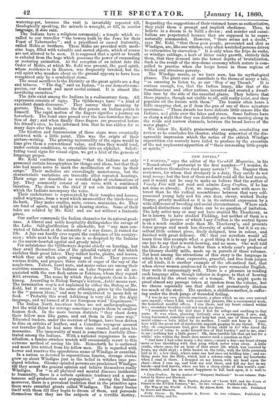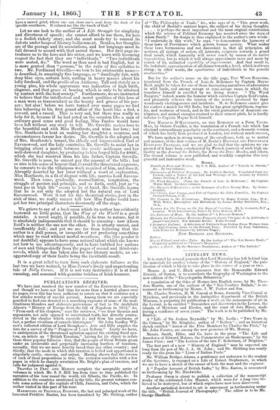NEW NOVELS. * " I WONDER," says the editor of the Cornhill
Magazine, in his " Round-about " postscript to the first number—" I wonder, do novel writers themselves read many novels ? " No. Happier than reviewers, for whom that drudgery is a duty, they surely do not read many; but the best of them no doubt read all the best novels, and it would not be easy to make us believe that the author of Vanity Fair will not read and admire Lucy Crofton, if he has not done so already. Few, we imagine, will note with more in- terest than he the radical resemblance between that very self- possessed young lady and his own dear, clever, wicked Becky Sharpe, greatly modified as it is in its outward expression by a wide difference of breeding and social circumstances. Where such marked distinctions exist there can be no question of imitation. The lady artist may or may not have studied Mr. Thackeray, as he is known to have studied Fielding, but neither of them is a copyist. The picture of which Lucy Crofton is the central figure is on a much smaller scale than Mr. Thackeray's, and presents fewer groups and much less diversity of action, but it is an ex- cellent little cabinet piece, finely designed, true in colour, and finished with great delicacy. Oh! that our novelists would all learn from this example what a good thing it is to say just what one has to say that is worth hearing, and no more. One well told tale like Lucy Crofton is better than a whole year's produce of the literary shoddy mills, made up in parcels of three volumes. Not least among the attractions of this story is the language in which it is told : clear, expressive, graceful, and free from jargon of all kinds, it is another example of the oft-noticed fact, that when clever women condescend to write pure vernacular English, they write it surpassingly well. There is a pleasure in reading such language akin, though inferior in degree, to that of hearing it uttered by the sweet voice of a woman. We might quote in proof almost any passage taken at random from the volume, but we choose especially one that shall not prematurely disclose too much of the story. The speaker, a childless mother, is suffer- ing under the fresh pangs of wounded feeling. "I was in my own private sanctuary, a place which no one ever entered save myself; where I did, with tears and prayers, like a sacramental work, the homeliest needful offices. I was there, and my heart calmed within me ; secondary troubles could not touch me there.
"I remember well the first time I fled for refuge and soothing to that room. It was when, glancing listlessly over a newspaper, I saw, and being fascinated, somehow could not help but read, one of those horrors of moral crime—a baby killed by its mother. I could not bear it. I came here with the great sob of intolerable anguish gasping in my throat. Why, why, oh compassionate God, give the living child to her who dared the boldest act of crime to make herself free of that burden ? and to me, alas! to me ! nothing but a little grave ! Oh, thou terrible life that art but for a while! who within thy limits dare answer such a question as this ?
"And here I had come many a day since,—many a day—my heart always more or less throbbing with that pang which never went away. A little cradle, where once, for an hour of that sweet life which was counted by hours, my child slept ; a little basket on the table, with the little garments laid in it; a low chair, where some one had once sat holding him; and no- thing more but the Bible, which laid a solemn calm upon my heartache when I read it there. I dropped on my knees, with any head upon the chair—then I rose up, and took my seat there, and bid my face in my hands—and God knows, when one has a sharp stroke of this world's com- mon trouble, and has no secret happiness to fall back upon, it is well to • Lucy Crofton. By the Author of" Margaret Maitland." In one volume. Pub- lished by Hurst and Blackett.
A Life Struggle. By Miss Pardoe, Author of "Louis XIV. and the Court of France in the XVIIth Century," &c. In two volumes. Published by Booth.
The Way of the World. A Novel. By Alison Reid. In three vols. Published by Hurst and Blackett.
Nelly Carew. By Marguerite A. Power. In two volumes. Published by Saunders, Otley, and Co.
have a sacred grief, where one can clear one's soul from the dust of the ignoble overthrow. It calmed me like the touch of God."
Let no one look to the author of A Life Struggle for simplicity and directness of speech; she cannot afford to use them, for hers is a foolish rickety story, and she must needs try to conceal its defects under heaps of literary bedizenment. Besides, her thoughts are of the peerage and its associations, and her language must be full dressed to accord with that sacred theme. Her first page in- troduces us to the hero and his sister, and we learn with becoming respect the fact that they are "individuals." "Two individuals were seated, &c." The word as thus used is bad English, but it is more genteel than "persons," in the ratio of five syllables to two. Mr. Ferdinand Greville—we bow to his aristocratic name— is described, in amazingly fine language, as "dazzlingly fair, with deep blue eyes, auburn hair, curling in heavy masses about his lofty forehead, and the profile of an Antinous. Tall and stately as a young pine, his whole appearance was indicative of high birth, elegance, and that grace of bearing which is only to be attained by contact with the best society." Furthermore, we are instructed to believe that the intellectual and moral qualities of this love of a man were as transcendant as the beauty and graces of his per- son ; but alas before we have turned over many pages we find him behaving in his first grand affair of the heart like a fool, a coward, and a rascal. This is very sad, but there was really no help for it, because if he had acted on the occasion like a man of ordinary good sense and good feeling, Miss Pardoe would have been left without any story to tell. Mr. Greville makes love to the beautiful and rich Miss Heatheote, and wins her love ; but Mrs. Heatheote is bent on making her daughter a countess, and circumstances favour her desire. Mr. Greville is the adopted son of Mrs. Heathcote's tenant, the elderly and impoverished Earl of Ravenswood, and the lady constrains Mr. Greville to assist her in bringing about a match between the needy nobleman and her well-dowered daughter, by producing to him forged bills for 40001., which she had received from his late father, Captain Greville. Mr. Greville is poor, he cannot pay the amount of the bills ; but so nice is his sense of honour that, to avoid the threatened exposure, he consents to do the villainous work required of him, and does it. Abruptly deserted by her lover without a word of explanation, Miss Heatheote, in a fit of disgust with life, marries Lord Ravens- wocd. Then come, gradually, reconciliation, temptation, the struggle of passion and principle, and so forth, until, just as "a faux pas in -high life" seems to be at hand, Mr. Greville learns that he is not only the adopted but the natural son of Lord Ravenswood. Were it not for this theatrical stroke, just in the nick of time, we really cannot tell how Miss Pardee could have got her two principal characters decorously off the stage.
We grieve to say of a book upon which its author has evidently bestowed no little pains, that the Way of the World is a great mistake. A novel ought, if possible, to be true to nature, but it is absolutely indispensable that it should be amusing : now Alison Reid's is neither the one nor the other. It is utterly unreal, and insufferably dull ; and yet we are far from believing that the anther is a dull person, or incapable of yet producing something which may be read without mortal weariness. She (the gender is not doubtful) appears to have some natural talent which she knows not how to use advantageously, and to have imbibed her notions of men and things chiefly from the pages of second and third-rate novels, which she has taken also for her literary models, an ex- aggerated copy of their faults being the inevitable result.
It is a great relief to turn from such elaborate failures as the last two we have noticed, to Miss Power's lively and unpretending tale of Ray Carew. If it is not very instructive it is at least amusing, and seasoned with genuine touches of Irish humour.



























 Previous page
Previous page